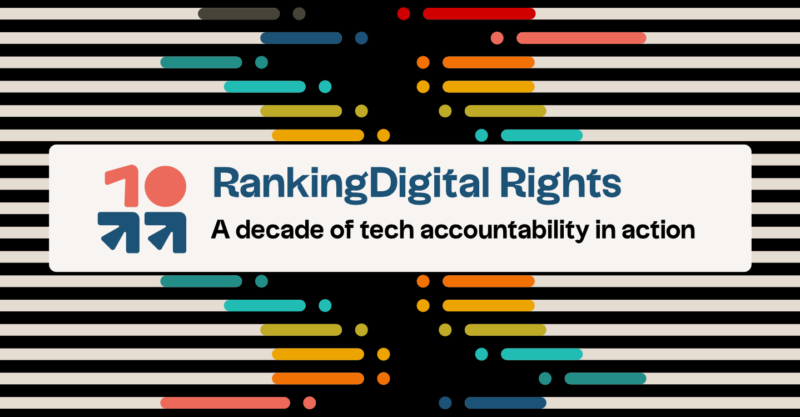
With the release of her pivotal Consent of the Networked in 2012, RDR Founder Rebecca MacKinnon issued a call to action for civil society to defend our digital rights from companies with the same rigor with which we’ve previously fought for our rights before governments. In 2013, Rebecca answered the call directly by launching Ranking Digital Rights based on the idea that there needed to be a standard against which companies would be measured for adherence to human rights.
Whereas RDR first encountered strong resistance from companies, today, through sustained engagement, it has helped create a “race to the top,” propelling Big Tech and Telco giants toward improved policies that better protect human rights in the digital sphere, from stronger privacy protections to companies’ first-ever transparency reports. Since 2020, RDR’s data has been cited with growing frequency in increasingly common shareholder proposals, at companies from Meta to Alphabet, put forward by the responsible investor community to hold the tech sector accountable.
While RDR has seen its influence grow among companies and investors, it has also been employed with increasing frequency to hold smaller tech companies, as well as subsidiaries of the companies evaluated by our Scorecards, accountable to marginalized populations as well as to citizens living in complex socio-political conditions, from Iran to Russia, from Southeast Europe to South and Central Asia, and by LGBTQ advocacy organization GLAAD in the U.S.
To mark a decade of milestones, you can now browse our Decade of Tech Accountability in Action page. Here’s what you’ll find:
Take a look back at our top 5 accomplishments over 10 years: With over a decade of work, there’s a lot to choose from. So what are we at RDR most proud of? See what made the cut among our top 5 accomplishments over 10 years.
RDR Looks to the Future: To mark this important occasion, RDR held its first-ever in-person retreat this spring. Check out our strategic priorities as we step into our second decade.
A Conversation with RDR Funder Rebecca MacKinnon: From RDR’s early days to her proudest RDR moments to her current work with the Wikimedia Foundation, check out this can’t-miss conversation between Rebecca and RDR’s Research Manager Zak Rogoff.
Testimonials: RDR has worked with everyone from global civil society to investors to companies to achieve our priorities. Take a look at what our partners and stakeholders have to say about working alongside RDR.
The RDR Timeline: Take a look back at some of our most pivotal moments.
Deep Dive into 10 Years of Impact: Hear first-hand from some of the partners and actors who have had the most lasting impact on our work, and on the digital rights field at large. Check out the following 5 stories to discover how RDR works with global civil society partners, companies, policymakers, and investors to push for change:
- Partners: Moving Beyond the Silicon Valley and Brussels Bubbles
- Partners: From LGBTQ Rights Online to User Rights in Iran: Hear Directly from RDR’s Partners
- Policy: Misinformation by Design
- Investors: Tackling Big Tech From Within
- Coming soon! Companies: Three Telecoms Take on Improved Human Rights Policies–With Help from RDR
If you’re interested in where RDR is headed, check out our call for consultation on our upcoming standards for generative AI →
RDR Issues Call for Consultation on Generative AI Accountability Standards

In the fall of 2023, Ranking Digital Rights will release the inaugural Generative AI Accountability Scorecard, a report card roadmap for consumer-facing generative AI services to respect the human rights to privacy, non-discrimination, freedom of expression, and freedom of information. The Scorecard will rely on this set of draft indicators as a basis for scoring.
For more information on this project, including the rationale for its creation, please check out our June 2023 report published alongside RDR’s set of preliminary standards on generative AI, which formed the basis for these draft indicators.
Before we transform this draft into final indicators and conduct our evaluation, we’re looking for input from civil society experts and partners. If you’re interested in providing feedback, please email us at methodology@rankingdigitalrights.org.
You may also contact our Research Manager Zak Rogoff at rogoff@rankingdigitalrights.org.
For more info, please check out our full draft indicators. →
Among Censorship and Shutdowns, RDR’s Methodology Is Spotlighting the Need for Transparency in Central Asia

In January 2022, protests broke out in Kazakhstan due to rising gas prices. Protestors, who the government accused of attempting a coup, were met with violent repression from law enforcement authorities and armed groups. Access to the internet was also quickly restricted, as it had been previously in both 2021 and 2020. A similar tendency toward restricting online freedoms has been noted in Uzbekistan and Kyrgyzstan.
It is within this context that RDR supported local Central Asian digital rights organization the Public Fund Civil Internet Policy Initiative (CIPI) in researching whether and how tech companies—including telcos, e-commerce platforms, and fintechs—in Central Asia have committed to respecting human rights and protecting their users.
Though their research points to several gaps in company policies, perhaps the most glaring omission observed is their failure to provide transparency on policies for responding to government requests for internet shutdowns, despite the imminent threat these present to human rights across the region. Secondly, CIPI’s research further highlights a trend RDR has previously reported on: the tendency of large telecommunication companies, often based in Western Europe, to provide fewer human rights protections to the users of their subsidiaries abroad. This is a gap that must immediately be bridged.
Read more about the impact of these companies on human rights in Central Asia, and how CIPI is working to improve human rights policies in the region. →
For even more info, check out the full report. →
Is Momentum on Tech Shareholder Activism Stalling? How to Reinvigorate It in 2024

Though support for investor proposals at annual AGMs (annual general meetings) was down overall this year, the overall number of human rights-based proposals was up – by 14% since 2020. This is just one of many emerging trends that those in the responsible investor community should take note of as we work to improve support during next year’s round of meetings.
In a recent post, we highlighted a number of patterns that may have impacted support in 2023. These include:
- Ever-present barriers like the dual-class share systems at companies like Meta and Alphabet continue to give founders extremely inflated voting power and play a role in limiting proposals’ success.
- After last year’s period of uncertainty in the tech sector, shareholders may also be refocusing their attention on proposals where risks can be more clearly linked to companies’ business outcomes and materiality.
- While the number of overall proposals has increased, the number of specifically anti-ESG proposals has skyrocketed. Where they were almost nonexistent before 2020, over 50 were filed in 2023. In some cases, proposals put forward by “anti-ESG” groups may have created confusion by employing similar language to those that call for politically agnostic disclosures on human rights issues.
- Large institutional investors often rely on analysis from ESG ratings agencies to inform voting decisions. As we discussed in a recent piece, these ratings often lack the grounding in international human rights standards that the RDR Corporate Accountability Index and other human rights benchmarks offer.
In the coming weeks, we’ll be joining forces with the Investor Alliance for Human Rights’s Anita Dorett to take a deeper look into some of the results at this year’s meetings and share how investors and our partners can learn from the trends of the past two years to create stronger and more effective shareholder advocacy at Big Tech companies in 2024.
Read more on this and on the specifics of RDR-supported proposals at Meta, Alphabet (Google), and Amazon. →
RDR Media Hits
NPR: RDR’s Research Manager Zak Rogoff spoke to NPR about shareholder advocacy ahead of Big Tech annual general meetings.
Support Ranking Digital Rights!
If you’re reading this, you probably know all too well how tech companies wield unprecedented power in the digital age. RDR helps hold them accountable for their obligations to protect and respect their users’ rights.
As a nonprofit initiative that receives no corporate funding, we need your support. Do your part to help keep tech power in check and make a donation. Thank you!





